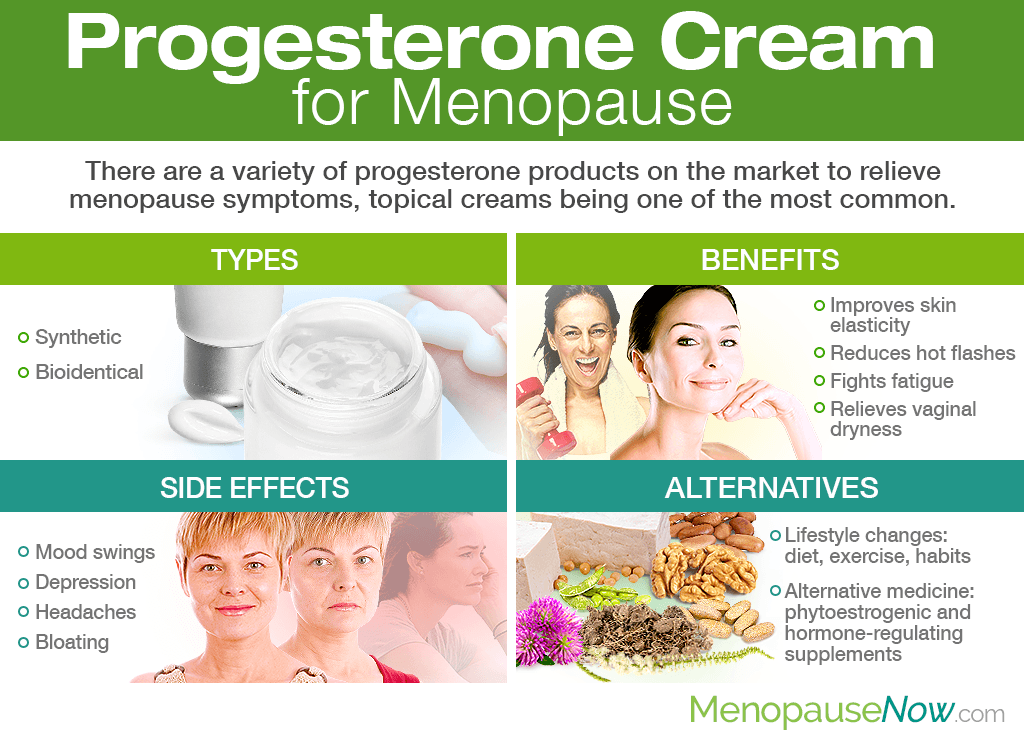There are a variety of progesterone products on the market for women to use for hormonal imbalance symptoms, topical progesterone creams being one of the most common. Keep reading to learn more about progesterone cream for menopause, including types available, benefits, side effects, and possible alternatives for complete hormonal health.
Types

There are two different types of progesterone creams for menopause: synthetic and natural.
Synthetic progesterone creams are composed of progestins, where are pharmacological compounds created to be structurally similar to endogenous hormones.
Natural progesterone creams for menopause, also known as bioidentical progesterone creams, are created from plant sterols that come from soybeans and Mexican yam roots. These compounds are extracted and then synthesized in a lab to be chemically similar to the progesterone found in the female body.
Both over-the-counter progesterone creams and natural progesterone creams for menopause are widely available. Speak with your doctor about which type and brand will suit your specific needs best.
Benefits

When taken alongside estrogen by women who still have a uterus, progesterone decreases the risk of endometrial cancer. Women without a uterus do not typically need to take progesterone, which is important as estrogen taken alone has fewer long-term risks.
Also, progesterone cream in menopause is used to alleviate a variety of menopause symptoms, including, but not limited to:
- Enhancing skin elasticity
- Improving loss of libido
- Combating weight gain
- Fighting fatigue
- Reducing hot flashes
- Relieving vaginal dryness
And more
Side Effects

Reported side effects of using progesterone cream for menopause include:
- Mood swings
- Depression
- Nausea
- Drowsiness
- Anxiety
- Irritability
- Spotting
- Headaches
- Fluid retention
- Bloating
- Reduction of HDL cholesterol levels
- Fatigue
- Weight gain
- Breast tenderness
Also, there may be local irritation where the topical progesterone cream was applied. To avoid this, change application sites with each use.
If any side effects surface or worsen, speak with your doctor right away about necessary treatment plan adjustments. Every woman will react differently to the application of progesterone cream.
Alternatives

While it is true that progesterone cream can bring women relief from some of their menopause symptoms, there are other useful methods to pursue that do not involve pharmaceutical measures.
Natural and effective menopause symptom treatments involve making lifestyle changes alongside the use of alternative medicine, both of which involve little to no risk yet can bring about some of the most effective results.
Lifestyle changes
Women should start with an improved diet rich in phytoestrogens, or plant-based estrogens. Examples are soy products, legumes, nuts, seeds, fresh fruits, and vegetables. Also, eat smaller meals more often throughout the day with a healthy balance of lean protein, healthy fats, and complex carbs.
Next, women should partake in regular exercise for half an hour, five times a week, combining aerobic, strength-training, and weight-bearing activities for mood boost, bone health, and improved sleeping patterns. Break up the exercise throughout the day if necessary.
Furthermore, women are encouraged to have healthy habits that consist of sleeping at least seven to eight hours per night, quitting smoking, cutting down on caffeine and alcohol intake, practicing stress-relief techniques, and more.
Alternative medicine
The two principal options for optimal endocrine system health during and after menopause are phytoestrogenic herbal supplements and hormone-regulating supplements.
Phytoestrogenic herbal supplements contain potent phytoestrogens that help allay an estrogen imbalance in the body. Classic examples are black cohosh, dong quai, and red clover. It is advised to only use them short-term and under close supervision of a certified herbalist as they contain exogenous hormones, an introduction of which into the body can make it less capable of producing its own.
In contrast, hormone-regulating supplements, like Macafem, stimulate the endocrine glands to produce more of their own hormones, thus promoting natural production for hormonal imbalance. Because they do not introduce exogenous hormones into the body, they are safer for long-term use against a variety of bothersome menopause symptoms.
Key Takeaways
Synthetic and natural progesterone creams for menopause are some of the most popular options on the market for women looking to find relief from symptoms of hot flashes, fatigue, vaginal dryness, and weight gain. However, their side effects - which include depression, headaches, anxiety, nausea, bloating, and more - lead many women looking for more natural alternatives. Principally, lifestyle changes alongside the use of alternative medicine can reap great, long-term benefits toward a hormonally balanced, symptom-free life.
Sources
- Apgar, B.S. & Greenberg, G. (2000). Using Progestins in Clinical Practice. American Family Physician, 62(8), 1839-1846. Retrieved June 26, 2019, from https://www.aafp.org/afp/2000/1015/p1839.html
- Cleveland Clinic. (2017). Hormone Therapy. Retrieved June 26, 2019, from https://my.clevelandclinic.org/health/treatments/15245-hormone-therapy
- Fugh-Berman, A. (1999). Wild Yam Cream, Diosgenin, and Natural Progesterone: What Can They Really Do for You? Retrieved June 26, 2019, from https://www.nwhn.org/wild-yam-cream-diosgenin-and-natural-progesterone-what-can-they-really-do-for-you/
- Holzer, G. et al. (2005). Effects and side-effects of 2% progesterone cream on the skin of peri- and postmenopausal women: results from a double-blind, vehicle-controlled, randomized study. The British Journal of Dermatology, 153(3), 626-634. doi: 10.1111/j.1365-2133.2005.06685.x

